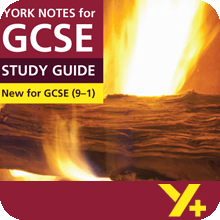Examiner's Notes
You assessed this answer as Grades 8–9.
Hover over the highlighted text to read the examiner’s comments.
Question: Read from ‘“All my heart is yours, sir …”’ to ‘… “as happy as I can be on earth”’ (Chapter 37).
Write about Jane’s search for happiness and fulfilment and how this is presented at different points in the novel.
In your response you should:
- refer to the extract and the novel as a whole
- show your understanding of characters and events in the novel
- refer to the contexts of the novel.
Throughout the novel as a whole, the protagonist and first person narrator Jane travels both literally and metaphorically. The novel – a Bildungsroman in the sense that it documents her formative years – shows Jane’s growth and development, from child to adult, from poverty to wealth via her inheritance, and from loneliness to love. By the end of the story, as this extract shows, she finds the contentment she has been searching for in her marriage to Rochester but not at the expense of her integrity, her character and her principles.
In this extract, Jane describes marriage to Rochester using words like ‘rewarded’, ‘prayer’, ‘wish’ and ‘happy’, which reflect her sense of fulfilment at their relationship as husband and wife. The phrase ‘as happy as I can be on earth’ reflects the intensity of Jane’s feelings and suggests her love for her future husband has a spiritual dimension. Later in the chapter, she says that their marriage is indeed a happy one, that Rochester’s sight returns, and that they have welcomed a ‘first-born’ child into the world.
Brontë reflects the dominant values of the time about women’s roles. Jane’s Christian faith and her happiness in becoming a wife and a mother can be viewed as a highly conventional ‘happy ending’ for a young Victorian woman. However, the pious and morally upstanding St John Rivers might have seemed a better match for Jane, just as Jane earlier presumes that Blanche is an ideal match for Rochester. Furthermore, by telling the story of Bertha Mason within the novel, Brontë also reveals another angle on Victorian marriage – a tale of secrecy, mental disturbance and trauma.
The novel’s conventional happy ending contrasts with many of Jane’s earlier experiences of difficult circumstances, including her experiences in the red-room, where she was viewed as a ‘discord … like nobody there’, at Lowood (‘an irksome struggle with difficulties’,) and the misery of the day Jane is supposed to marry Rochester, only to discover in dramatic fashion that her betrothed has ‘a wife now living’. Immediately after this, Jane describes her prospects as ‘desolate’ and her ‘hope quenched’. These descriptions create a bleak and wretched mood that adds to the reader’s sympathy for Jane and admiration for her integrity and her powers of endurance. This is one of several dramatic turning points in the story, when Jane shows integrity and trusts her instincts about her next steps, bravely continuing her search for happiness.
At Whitcross, Jane asks searching questions: ‘What was I to do? Where to go?’ before finding reasons for hope in the beauty of nature and in the kindness of strangers. Jane finds companionship and ‘intimacy’ with the Rivers family, although the brother St John is initially distant. Later on, Jane shows certainty and conviction when she turns down St John’s proposal. Although she respects and shares his Christian faith, she does not believe it is ‘God’s will I should marry you’. She then hears Rochester’s voice calling to her. Brontë shows this to be a pivotal moment of decision for Jane, using spiritual language that suggests a higher power is at work.
By the end of the novel, Jane finds happiness in marriage and motherhood after many difficult experiences. She is guided by her faith but also by her passionate and strong character: ‘It was my time to assume ascendancy. My powers were in play’. Throughout the novel, Brontë shows Jane to be an extremely independent, intelligent and courageous spirited heroine.
